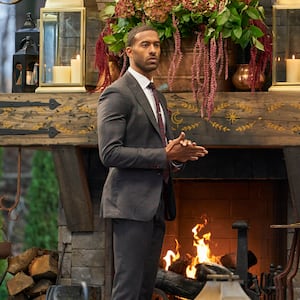On Wednesday morning, a former Bachelor appeared on Good Morning America with a big announcement. “Obviously this year’s been a lot for a lot of people,” Colton Underwood told host Robin Roberts. “And it’s probably made a lot of people look themselves in the mirror and figure out who they are and what they’ve been running from or what they’ve been putting off in their lives.”
“I’m gay,” he said, “and I came to terms with that earlier this year and have been processing it.”
Underwood has dealt with rumors about his sexuality for years, and it’s gratifying to see the former Bachelor has finally found a way to proudly live his truth. A number of celebrities and Bachelor alums have already voiced their support for Underwood. But the way ABC handled the interview was strange at best, and at worst deeply irresponsible. In her rush to validate Underwood, Roberts essentially brushed aside the temporary restraining order a judge granted Underwood’s winning contestant, Cassie Randolph, last year.
Last September, Randolph alleged Underwood had been harassing and stalking her, including placing a tracking device on her car and lurking outside her bedroom window at her parents’ home at 2 a.m. Randolph dropped the restraining order in November after the two reached a private agreement, and in a statement at the time Underwood wrote, in part, “I do not believe Cassie did anything wrong in filing for the restraining orders and also believe she acted in good faith.”
Roberts vaguely mentioned the temporary restraining order, after describing Randolph as “the woman [Underwood] jumped the fence for on The Bachelor.” She mentioned “Cassie filing and then dropping a restraining order” against Underwood, but offered no details about the allegations.
Instead, it was Underwood who got to characterize the relationship’s demise—and the way he described it, the whole thing sounds like a standard break-up.
“I’d like to say sorry for how things ended,” Underwood said. “I messed up. I made a lot of bad choices.”
“Were you in love with Cassie?” Roberts asked.
“Yes,” Underwood replied. “I mean, and that only made it harder and more confusing for me. If I’m being honest, I loved everything about her, and it’s hard for me to articulate exactly what my emotions were in going through that relationship was, because I obviously had an internal fight going on.”
“I would just say that I’m sorry from the bottom of my heart,” Underwood concluded, without ever offering insight as to what he’s sorry for. “I’m sorry for any pain and emotional stress I caused. I wish it wouldn’t have happened the way it did. I wish that I would have been courageous enough to fix myself before I broke anybody else.”
It’s worth going into detail about the “emotional stress” Underwood allegedly caused—because as much as we should empathize with the emotional turmoil that led Underwood to this self-actualization, that also does not negate the fact that the way he allegedly treated Randolph sounds genuinely terrifying.
Randolph and Underwood broke up in May of last year. As People reported last September, Randolph’s request for a restraining order alleged that Underwood “has admitted to a few mutual friends and coworkers that he placed the tracker on [her] car and used the alias phone numbers to send the anonymous text messages to [Randolph], himself, and others.”
Randolph also alleged that Underwood sent both her and himself a text message pretending to be an anonymous stalker. She claimed he took “obsessive” walks to her apartment in Los Angeles, where he would appear unannounced, and that he also appeared uninvited at her parents’ house in Huntington Beach, People reports.
To downplay Underwood’s behavior, or to explain it away as the simple result of grappling with his sexuality, does a disservice to both women and queer people.
Women already face an uphill battle in getting authorities to take stalking and harassment complaints seriously. Consider the tragic murder of Shana Grice—who reported her ex-boyfriend’s stalking several times to the police before her ex-boyfriend slashed her throat and set her body on fire. (But only after police fined Grice £90 for “wasting their time.”) Or when Anita Sarkeesian, during the mess that was Gamergate, had to cancel a talk at Utah State University after the university received an email threatening an act “worse than the deadliest school shooting” because police refused to pat attendees down or use metal detectors to ensure everyone’s safety.
To characterize Underwood’s actions as merely the result of emotional confusion is grossly irresponsible; plenty of queer people struggle to come to terms with their identity before coming out, but most of them find a way to do it without allegedly installing a tracking device on their ex’s car.
There’s no question that Underwood’s personal journey has been a difficult one. On GMA, he described finding himself in a “dark and bad” place.
“There was a moment in LA that I woke up and I didn’t think I was going to wake up,” Underwood told Roberts. “I didn’t have the intentions of waking up, and I did. And I think for me, that was my wake-up call of, ‘This is your life. Take back control.’” He described “suicidal thoughts, and driving my car close to a cliff like, ‘Oh, if this goes off the cliff, it’s not that big of a deal.’”
“I don’t feel that anymore,” Underwood concluded, his voice breaking.
Underwood’s emotional process was made more difficult, in some ways, by being placed in the spotlight as “the virgin Bachelor.” As fans speculated about Underwood’s sexuality during his season, Billy Eichner offered his own theory during his celebrity appearance on The Bachelor—tossing out the possibility that Underwood was “the first gay Bachelor.”
“I fully was a virgin before [The Bachelor], and I could never give anybody a good enough answer of why I was a virgin,” Underwood said. “The truth is I was a virgin Bachelor because I was gay, and I didn’t know how to handle it.”
Now, Underwood said, “I’m emotional, but I’m emotional in such a good, happy, positive way. I’m the happiest and healthiest I’ve ever been in my life, and that means the world to me.”
But as wonderful as it is for any queer person to find self acceptance, coming out should not allow anyone to sidestep accountability. Just as Hollywood did not allow Kevin Spacey to use coming out to avoid addressing allegations of molestation, Underwood’s announcement should not shield him from taking responsibility for whatever transpired with Randolph.
This is what makes Underwood’s interview so complicated. The candor with which he describes his journey is commendable, and as Roberts notes, it will likely help young gay men like Underwood—particularly, perhaps, young athletes who relate to the former football player—embrace their own identities. Young gay Christians might also respond to Underwood’s frank description about how self-acceptance has helped him feel more connected with a god he once prayed would make him straight. But to praise Underwood while simultaneously shrugging off Randolph’s allegations doesn’t help anyone—especially as Underwood seemingly seizes this moment as a new branding opportunity.
Roberts teased that more of her interview with Underwood will air on Nightline—so perhaps then, we will hear additional details about why things unfolded with Randolph the way they did, and whether Underwood has been able to make amends. But in the meantime, Variety reports that Underwood reportedly has a Netflix reality show already in the works “focusing on Underwood living his life publicly as a gay man.”
A representative for Netflix declined to confirm or comment on the series. Representatives for Underwood and Randolph did not immediately respond to The Daily Beast’s request for comment.



